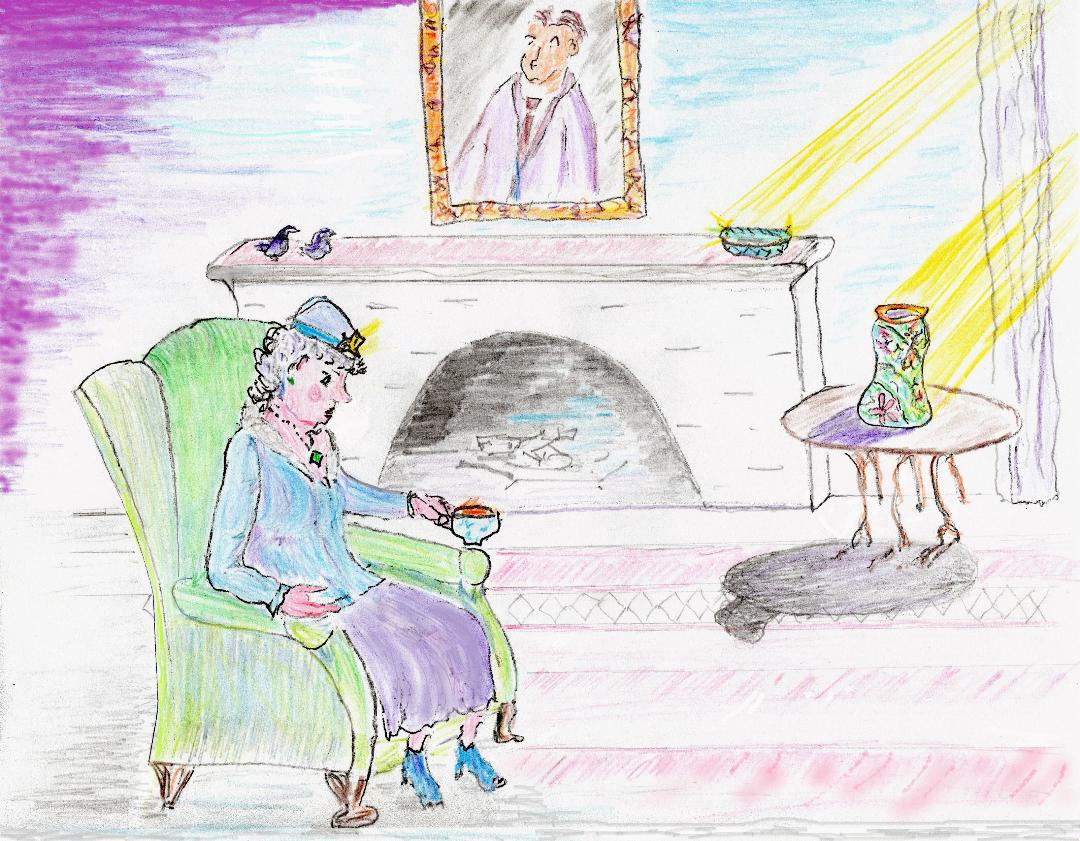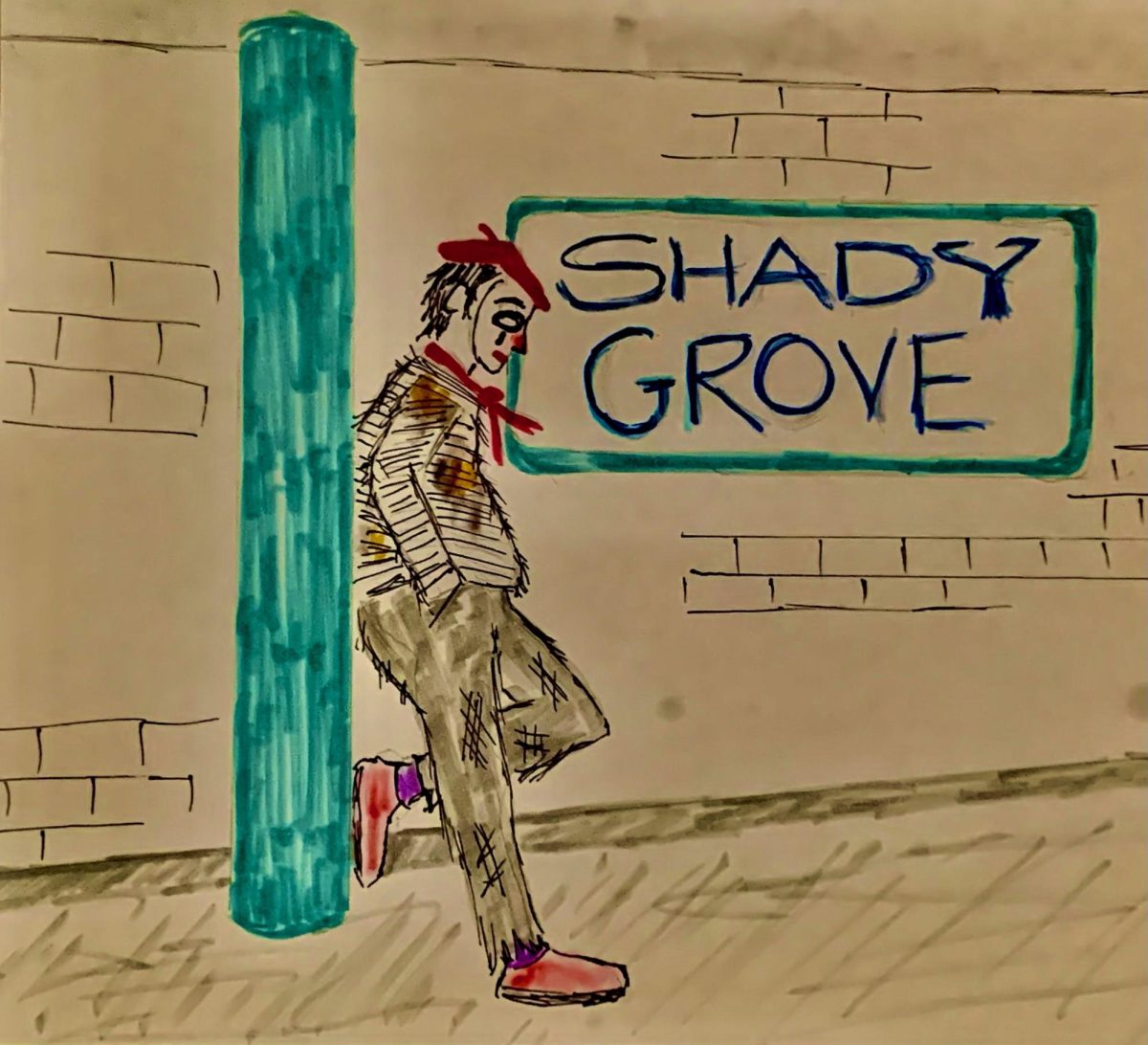Herman Delaney’s mother had quite the critical eye. Herman, now in his late 20s, was an only child and naturally a bit apprehensive about bringing Libby home. She was the fifth woman he had dated over the past year.
They met at a dance three months ago and hit it off immediately. He was convinced Libby was the one and planned to propose at Master’s Steakhouse on Saturday. But she would have to meet mother first.
His mother invited them for tea after they returned from a qualifying race at Indy. They sit in the living room around the fireplace. Father is there in spirit, perched over the mantle in gilded frame. Their Victorian mansion is well appointed with brocade drapery that touches marble floors, and a silent Steinway that stretches before a wall of windows overlooking a manicured landscape.
An Oriental rug defines the conversation area. The room is populated with a camelback sofa with clawed feet flanked by antique end tables with Florentine lamps. A wing chair relaxes opposite the sofa, and two club chairs sit awaiting orders. Books and artefacts from around the world speak volumes about the Delaney’s. Hanging ivies eavesdrop from sconce planters.
Libby nestles against Herman on the sofa, his arm wrapped around her. Mother sits comfortably in her wingback chair, one leg crossed at the knee. The three nibble crumpets and sip tea from bone China chatting about nothing–at first anyway. Then mother sets down her teacup and dabs the corner of her mouth. “So I understand you and Herman are quite serious.”
“We are in love, that’s true.” Libby looks at Herman who smiles.
“Yes mother, we are madly in love, and I think Libby would agree we are a very close match.”
Libby nods and gives him a loving gaze.
Mother swallows hard and tries to suppress a wince. That Herman or anyone but she could be the judge of that, harrumph. She recovers with a wan smile for Libby. “Do you plan a large family then?”
“Mother! We’re not engaged yet. Please! Where are your manners?”
“I’m so sorry.” She raises her silver teapot. “More tea, darling?”
Libby takes the effrontery in stride with two lumps of sugar. Mother then asks a fateful question wrapped inside a statement: “So my dear, I understand you know something about pottery.”
“Why yes, Mrs. Delaney. I’m a botanist and master gardener, but I’m also an avid potter, and enjoy turning earthenware, mostly pitchers and dinner plates. Bumblebees are my trademark.”
“Oh, I see. How very nice.”
Herman lends his testimony. “You should see her work, Mother. It’s extraordinary.”
Mrs. Delaney picks up her tea and again looks at Libby. “I bet you are very good at it too…But no, my dear, what I’m asking about is fine porcelain. That’s the most important kind, don’t you think?” She peers primly over the rim of her cup.
Libby studies the woman sitting there in blue sequined dress and fake eyelashes. Bouffant hair whirls around her head like whipped cream. Lake-blue eyes that can freeze into lasers preside over the affairs of her universe. A nose, perfect for condescension. The parchment skin stretching across her face frames a furnace whenever her mouth opens. A pineapple-cut emerald peaks from her decolletage while teardrop earrings distract from facelifts. A silk blue-green scarf camouflages the terrain of her neck.
“Porcelain?” Libby curls her lip at the word but does not venture a response.
Trying to mend things, Herman points. “See that vase next to the fireplace, my love. Mother is dying to tell you about it. Aren’t you mother?’
Mrs. Delaney rises and strides to the table by the fireplace for show-and-tell. “My dear, this is a very special piece. Come see.”
Libby politely obliges.
“Henry’s father bought it for me while we were in Beijing. It’s a 16th Century lotus-scroll Ming. That cobalt blue contrasting the gold rim is just so striking, don’t you think?” She rambles without waiting for a response. “The body is detailed oh so delicately with these fruity sprays of pomegranate, peach and crab apple.” Mrs. Delaney touches the vase lightly. “And see the lotus scroll? It wraps all the way around enclosing sprays of peony, chrysanthemum and camellia. The total impact just takes your breath away.”
“Wow, really nice, Mrs. Delaney. I admire your taste.”
“Oh, It’s not about my taste really. It’s simply a priceless piece of art.”
Mother excuses herself rather abruptly, ostensibly to powder her nose.
Herman joins his soon-to-be fiancé standing by the vase and whispers. “Mother can be a stickler.”
“It’s ok, Herman. …And what’s this, lead crystal?”
As Libby reaches for it, the candy dish slips from the mantle and crashes into the vase, knocking it to the floor.
Mother rushes in with a shriek. “Her-mannn, what’ve you done? That’s, that’s irreplaceable?”
“I’m sorry, mother, It’s all my fault. Maybe we can get it repaired.”
“Repaired? That cannot be repaired! No one in the world could repair that.”
“Mother, there are crafts people who know how to repair with barely a trace. Why haven’t you seen “The Repair Shop” on British TV? They do it all the time. Everything’s going to be fine. Just take a breath and sit down. I’ll get you a cool glass of water.”
Mrs. Delaney reclaims her throne with an expression as if a stranger had squeezed too much lemon in her tea. An awkward silence hangs between the two women like an odiferous fog. Libby crosses her legs but tries to relax. She reflects on how much she cares for Herman and her culpability in the matter.
Then she ventures into the mist with words that, as soon as they leave her lips, seem a mistake. “You know, Mrs. Delaney, I could get that fixed for you. I’m good at puzzles and I do know something about restorations. Just point me to a dustpan, so I can collect the pieces. There really aren’t that many.”
Still in shock, Mrs. Delaney isn’t able to navigate the scene as she normally would. She cough two words — “My God” – then makes a gurgling sound.
Libby stands. “Are you choking Mrs. Delaney?”
The dowager was about to say, “You silly waif,” but catches herself. “No, no, I’m–not–choking. There must be a hundred pieces there mixed with the crystal. You couldn’t possibly know how to…”
Herman hands her the glass of water. “Sip that. I’ll get the dustpan straightaway.”
Libby tries to ease the tension with a smile. “My father is a well-known architect for a major firm in the city. They do historic renovations all the time. He knows experts in all kinds of crafts.”
Mrs. Delaney tilts her head and gazes at Libby as if her son had dragged home an aardvark. “Do you think I would let an expert, in say, 19th Century cabinetry or ironwork, anywhere near this heirloom?”
Libby knows she must scrap the distorted figurine forming on her wheel and change tack. “I see where you’re coming from, Mrs. Delaney, and I agree. We need to find the right craftsperson. But don’t worry. My father has contacts across the country, so you won’t have to cross the Atlantic and talk to someone in a barn.”
Mother didn’t react well to the word ‘barn.’ “Well, I don’t, I mean, I never –”
“Mother, you really must take Libby up on her generous offer.”
Mrs. Delaney fumbles for words, her neck jittering from side to side.
“The least you can do is let her try.”
Libby smiles expectantly.
“Well,” Mother finally says, “you can ask your father to identify a foremost expert, but I will have the final say. Rest assured, if it’s the right person, I will pay handsomely.” Mrs. Delaney figures there are plenty of ways to wriggle away from a deal, but the immediate need is to move them along.
As the couple is leaving that evening, just before Herman tucks Libby into the passenger seat of his Maserati, he has to run back for his keys. Of course, they were in his jacket the whole time. He catches mother still in her wingback chair. “So mother, what do you think?”
“Out of all the women you have brought home over the past year, Herman, I think I like her the best.”
“So you approve then?”
“Well, she she does seem to have some nice qualities, and she doesn’t seem to be a gold digger.” It was not a resounding endorsement, but it did balance the need to demonstrate her love for her son while leaving room to swing the door closed on Libby at some later time.
“I think that’s as close to a yes as I’ll ever hear.” Herman kisses her on the forehead before scurrying down the front steps to his car.
On Saturday at Master’s Steakhouse, Libby seems a bit off. She says she’s OK, but Herman decides to wait for the flames to subside on their Cherries Jubilee. He taps the velvet box in his jacket and meets her green eyes across the table. He says he loves everything about her–the way she smiles, the twinkle in her eyes, blah, blah, blah, her generous heart, and he compliments her for the way she handled Mother.
Libby sets her spoon down and smiles. She really didn’t need to hear Herman’s mother mentioned in the midst of his proposal. She glances at the diamond sparkling against the checkered tablecloth and her thoughts race. They’re at the Indy 500. Herman zips past her in a yellow car and winks. As a top insurance executive, he’d be an excellent provider. Yes, he’s awkward at times, but he loves her and can be, oh, so romantic. Now a blue racer pulls from behind and pushes beside her. It’s Mrs. Delaney in racing glasses, her scarf dancing like blue-green flames. She turns and flashes a wizened smile.
Libby reminds herself that she would be marrying Herman, not his mother. He would, of course, inherit her estate. But she doesn’t care about the money. She wonders how much manipulation there might be…
“Libby, did you hear me?”
“Oh, yes. Herman. I just need to powder my nose.”
As Libby applies lipstick in the mirror, she fishtails around the bend. She downshifts and pulls into the pit. Her crew gasses her racer and pops on four new Goodyears. As they tighten the lugs, a blue streak screeches to a halt. Mother hops out and over the side of her car and squeezes in. “Drive,” she says. Libby floors it like she was planning anyway. Mrs. Delaney starts in and goes on and on about how Libby must care for her son, what to feed him, how to console him when he’s sad. Libby wonders if this race will ever end.
She can see the Ming vase now, in pieces. Herman’s mother runs Libby’s father batty, but they finally settle on an expert who will fix the vase in three months. When Libby and Herman present the final work, it is as flawless as flawless can be. Libby studies her reaction: Mrs. Delaney can’t believe her eyes. It appears flawless. But of course, there’s a feint wince.
With ruby lips, Libby returns and stretches her right hand across the table, and then pulls it back. “I love you Herman, but my final answer is ‘no.’”
Herman’s head sinks in lament. “It’s always my mother. She can grow on you, you know.”
“Yes,” Libby says. “Like mold, and it’s growing on you.”
“But what about the vase?”
“Tell her she’s right. It could never be restored to her satisfaction. But I know she’ll find something better, and maybe for you, too.”
# # # #














Norma Scism • Oct 23, 2024 at 4:37 pm
Enjoyed your story, Chuck. Thanks for sharing.
Daniel Neizmik • Jun 10, 2024 at 9:23 am
Well done, Charles! I could feel Libby’s discomfort and I cheered for her ultimate escape. If I’m ever invited to the Delaney’s, I will graciously decline!
Janet Marie Stiegler • Jun 2, 2024 at 4:45 pm
Great job, Chuck. So creative. I especially liked the description of Mrs. Delaney.
Best, Janet
Peter Bins • Jun 14, 2024 at 8:48 am
So colorful! Best story I’ve read this century! Gifted writer.